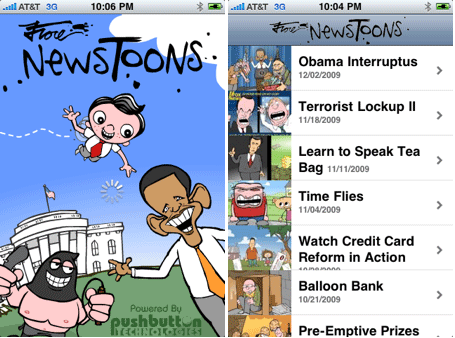
Update: Since this post ran, Apple has reversed its original decision. Mark Fiore’s iPhone app is now for sale. Full post is up here.
Yesterday we told you about Mark Fiore, the animated cartoonist who won this year’s Pulitzer Prize for editorial cartooning on Monday. Fiore wants to take his work mobile, but unfortunately for him, Apple rejected his iPhone app back in December, saying it “ridicules public figures.” The rejection email cited a clause in the iPhone Developer Program License Agreement, which bars any app whose content in “Apple’s reasonable judgement may be found objectionable, for example, materials that may be considered obscene, pornographic, or defamatory.”
After our story ran, Fiore got a call from Apple — four months after receiving a rejection email — inviting him to resubmit his NewsToons app. Fiore says he resubmitted it this morning. We’ll keep you posted on what happens. If history is a guide, though, this is likely to be good news for Fiore. Tom Richmond’s Bobble Rep app was initially rejected, then approved after a firestorm of online criticism. Daryl Cagle went through something similar last year.
But whatever happens with Fiore’s app, there is a broader issue at stake here. As Apple’s role in the mobile sector grows, should it get to dictate what content we can access? Dan Gillmor has been on a quest to find out what arrangement major news organizations have with Apple:
In addition, I asked the Times, the Wall Street Journal and USA Today — following up on a February posting when I asked why news organizations were running into the arms of a control-freakish company — to respond to a simple question: Can Apple unilaterally disable their iPad apps if Apple decides, for any reason, that it doesn’t like the content they’re distributing?
Guess how many responded? Zero. Today Rob Pegoraro at the Washington Post took up the same issue, asking a spokeswoman for his company the same questions, she directed him to Apple. Apple has not responded to Pegoraro. (I also have not heard back from Apple on requests for comment about its satire policy generally or in Fiore’s case in particular.)
So what should media do? I’m not certain what the answer is, but I do like the spirit of push-back in what Ryan Chittum of the Columbia Journalism Review wrote yesterday:
Look, let’s face it. The iPad is the most exciting opportunity for the media in many years. But if the press is ceding gatekeeper status, even if it’s only nominally, over its speech, then it is making a dangerous mistake. Unless Apple explicitly gives the press complete control over its ability to publish what it sees fit, the news media needs to yank its apps in protest.